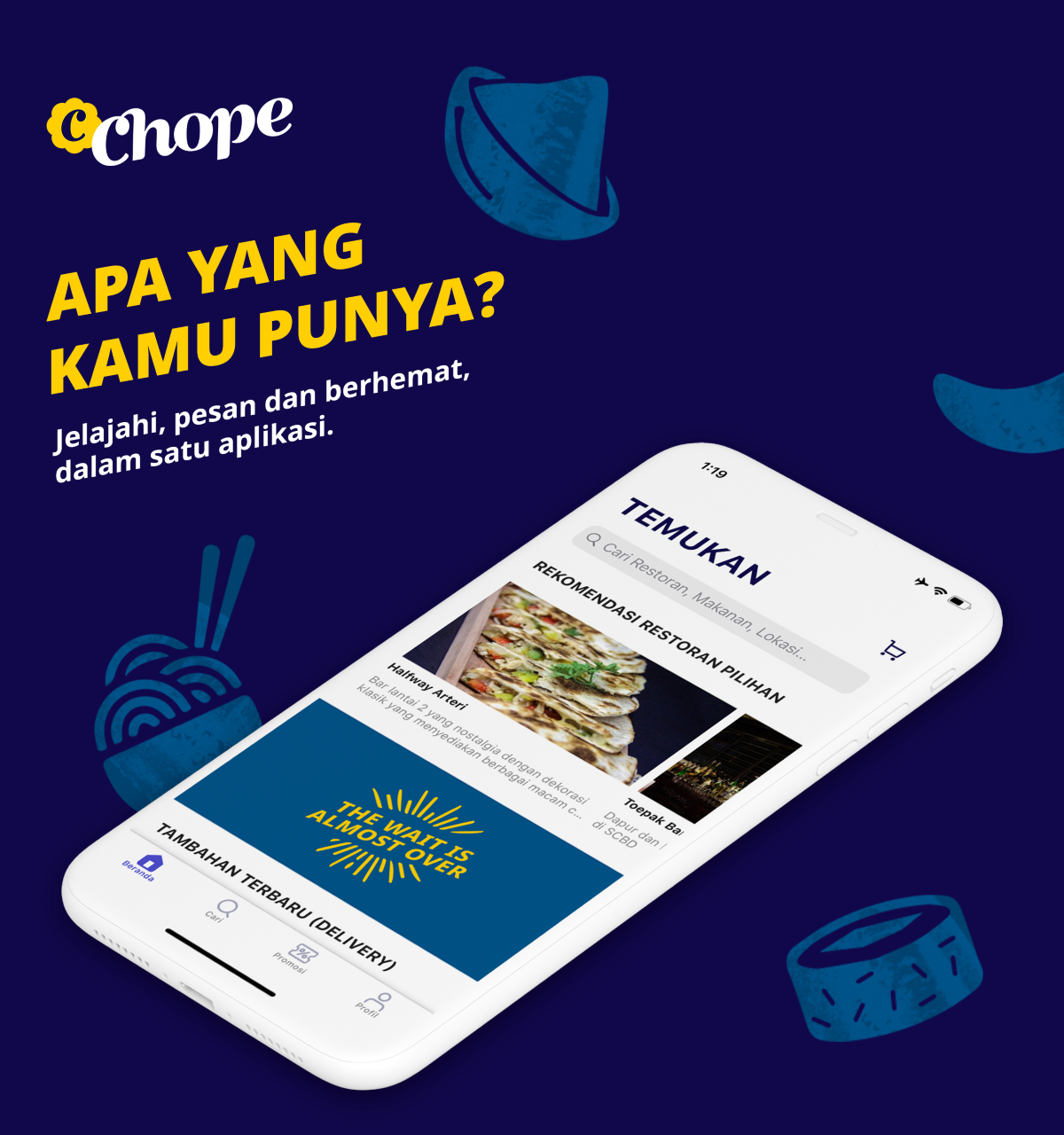"Food Discovery" Startup Huddles Throughout the Pandemic
DailySocial noted that at least four "food discovery" startups went out of business
Startups directors and review places to eat (food discovery) are also victims of the effects of the pandemic due to the reduced mobility of people in their spare time to eat outside the home. According to records DailySocial, at least this year there are four startups in this segment that have gone out of business in Indonesia.
They are Eatsy, Let's Eat, Club Alacarte, and lastly Zomato. Zomato recently disbanded its Indonesian operations team, although the app and website are still accessible. The remaining players, such as Chope, Qraved, Eatigo, and Traveloka Eats, are diversifying their businesses into food delivery to adapt to new habits. Only GoKuliner still survives as a startup directory.
According to Founder and Managing Partner AC Ventures Adrian Li, actually the F&B industry in Indonesia is worth billions of dollars because of the fast growing middle class. This is one factor why the industry continues to attract venture capital-backed tech startups.
However, the directory business is one of the business verticals that has to bite the bullet because they failed to monetize and realize their vision as a sustainable company.
“Many of these early models were focused as directories or listing who succeeded in obtaining and maintaining traffic significant, but unable to generate significant advertising revenue. "In the end the business closes or needs to pivot," explained Adrian to DailySocial.
In more depth, directory startups mostly rely on advertising as their core business model. Unfortunately they couldn't achieve monetization scale. Problems occur due to low advertising revenues from restaurants, the dominance of the restaurant chain business vs standalone, and a high concentration of mall-based restaurant businesses.
“Covid-19 has only accelerated the closure of these companies in existing businesses non-sustainable in Indonesia."
Therefore, he continued, there needs to be a change in business strategy by making food directory as an additional feature, not as a stand-alone business. A business like this can become a printing machine traffic which is effective and useful for consumers.
“But with the caveat that it must still generate direct income for the restaurant. This model has potential for selling coupons, shipping, pre-ordering, or pick up. We have seen this as a powerful driver for Gojek via Go-Food basically listing + delivery.”
Chope is getting into food delivery services
The formula presented by Adrian is quite reflective of the current conditions. Lots of startups foodtech who are flocking to provide food delivery services.
Draft Beer So one of the people who went there, even though not directly. According to Chope Indonesia General Manager Karthik T. Shetty, this pandemic has put the entire F&B industry and companies in a difficult position. Chope itself focuses as a reservation platform dine-in for consumers who want to enjoy treats at their favorite restaurant.
"Lockdown was the biggest obstacle for Chope because it brought our business to a complete standstill," he said.

These conditions do not necessarily mean that Chope has to lay off employees. Karthik ensured that there would be no dismissal of anyone on the Chope team, either in Indonesia or in other countries. “We all took it payroll deductions and fortunately our business model allows us to have some reserves that don't require us to layoffs. "
He said, the company CEO said “Don't let a crisis go to waste!”. Don't let a crisis go to waste (by not doing anything) on the entire Chope team. Therefore the team is working hard to develop the new Chope on Delivery service.
In Singapore, Chope's headquarters, they work with local taxi operators as food delivery partners for Chope's restaurant partners. This service exists because high-class restaurants complain that the fees they have to pay to local courier operators are too expensive.
“Our product and engineering teams are working non stop for 72 hours to modify the product Existing so that consumers can choose a specific menu, integrate with the taxi application, and we start onboard restaurants in Singapore to include on their menus. Each order will be sent to the nearest taxi to make delivery.”
Singaporeans routinely order food at upscale restaurants, so this method is inversely proportional to conditions in Indonesia.
For this reason, Chope on Delivery in Indonesia has been modified. Chope said it was difficult to find partners quickly and the integration process took time. Karthik also doesn't want to compete directly with GoFood or GrabFood.
Chope has e-commerce services on its platform. Finally, they sell vouchers from various menu packages, catering and regular, which are sold by restaurant partners. Buyers can claim voucher by contacting the restaurant via WhatsApp. Delivery will be made via GoSend or GrabExpress.
“Chope gives you the option to choose and order, but we don't do the delivery ourselves. "This method using WhatsApp is widely appreciated by restaurant partners because it is considered easier for the staff."
Consumer response to this service, Karthik claims, is not bad from a business perspective -- although it is not yet significant compared to before the pandemic.
“But the most important thing is that our restaurant partners see that we are still trying to do things to support them and they really appreciate this. Through this feature, we strive to stay relevant to our users, so they don't have to forget about Chope completely for months lockdown in Indonesia."
Apart from the Chope on Delivery service, the company is also diversifying its other businesses by selling hotel tickets because many restaurant partners are located in hotels. The "Save now, stay & dine later" service allows consumers to staycation at the hotel at low prices at any time and enjoy the various facilities provided by the hotel.
Companies create programs dining vouchers which is more flexible to help restaurant partners avoid cancellations and consumers who don't come (no-show). "This method is effective in reducing the number of cancellations because consumers can change their arrival date. No need to cancel if there is an emergency.”
Going forward, Chope wants to strengthen its technology to help more restaurants affected by the pandemic. Partners can maximize their revenue by utilizing the table reservation management system, build personalized with a CRM system, and deliver more customers to the restaurant. Not only in the form of marketing visibility, but also tracking and sending customers to restaurants.
"In the long term, we will expand our services to all tier 1 and 2 cities in Indonesia as well as with the rapid development of the F&B industry in other countries."
GoKuliner still survives as a directory

DailySocial also had the opportunity to interview the CEO GoFood Oswin Liandow. He said that when the strict PSBB was implemented last March, traffic GoCulinary continues to decline. A month into the pandemic, traffic down to minus 65% or only one third remaining.
This poor performance must be anticipated quickly by innovating. “We estimate when the pandemic ends, how things will change user behavior "during and after the pandemic, what can we do, and in the end there are many decisions we take," he said.
The toughest decision finally had to be taken in early April with employee efficiency. Oswin did not say how many employees were affected. “This is the hardest decision I have ever taken while building AsliKuliner. However, with all existing considerations, we have to take this step.”
Next is to think about what can be done for restaurant partners. Finally, GoingKuliner decided to help those who opened free delivery services by creating a special directory page with the hashtag GratisOngkir. This program is claimed to be successful. There are thousands of restaurants participating.
After the PSBB began to be relaxed, the company created a QR Code to view restaurant menus online via the site or the GoKuiliner application. It is claimed that there are thousands of restaurants that already use QR Codes and the number continues to increase every day.
When the PSBB transitioned and limited dining at restaurants began to open, traffic GoKuliner claims to be almost back to normal or 90% of what it was before the pandemic. Oswin believes in his strategy to stay in the directory and review a place to eat is right because it is always needed.
“In the future we are preparing several new projects to improve user excitement. One of them is GoCulinary Hunting for Coffee which will launch early December. Users can get one free coffee after going to five coffee shop different. They can choose from hundreds tenant who participated," he concluded.
Sign up for our
newsletter
 Premium
Premium


